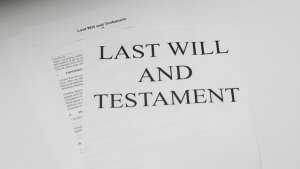Intestacy Rules
Jan Atkinson
Table of Contents
What Happens When Someone Dies Without a Will?
It is estimated that between half and two-thirds of the adult population have not made a Will. Where someone dies without a Will, the Intestacy Rules apply. This can result in your estate passing to people you would not have chosen and can cause significant financial hardship for your loved ones.
What are the rules of intestacy?
Intestacy occurs when a person dies without having made a valid will. In England and Wales, if you die intestate, your estate (property, money and possessions) will be divided among your closest relatives according to a specific set of guidelines.
The laws of intestacy are set out in the Administration of Estates Act 1925 and subsequent legislation set out in The Inheritance and Trustees Powers Act 2014. The rules are complex, but broadly speaking they provide as follows.
If you are married or in a civil partnership without children or grandchildren
The spouse or civil partner will inherit the whole of the estate.
If you are married or in a civil partnership with children
- Your spouse or civil partner will inherit your personal belongings, the first £270,000 of the estate and half of the rest of the estate.
- This means that where the estate is less than £270,000 the spouse or civil partner will inherit everything.
- The rest is split equally between the children.
If you do not have a surviving spouse or civil partner
- Your estate will pass equally to your children.
- If a child has already died, his or her children will inherit their share of the estate.
If you have no surviving spouse or civil partner or children
- Your estate will pass to surviving parents
- If the parents are dead, the estate will pass to other relatives in strict order, starting with siblings and then half-siblings, grandparents and aunts and uncles.
What if there are no surviving relatives?
In cases where the deceased’s relatives cannot be traced, your estate will ultimately pass to the Crown. This is known as bona vacantia. A few years ago, Prince Charles hit the headlines for using £3.3m of unclaimed legacies to fund his own charities, including funding for a private school in Scotland and an architecture group.
Who cannot inherit under intestacy rules?
The intestacy rules do not make provisions for:
- Unmarried partners (whether opposite-sex or same-sex)
- Stepchildren
- Ex-spouses, where you have officially divorced or dissolved the civil partnership
- Relations by marriage
- Friends
- Carers
This can cause real problems where people live together but are not married, or for blended families, as partners and stepchildren will not automatically inherit anything on their death.
Why should you make a will?
Making a Will is the only way to ensure that your property and possessions go to the people you want them to go to. It is particularly important to make a will if:
- You and your partner are not married or in a civil partnership
- You have young children
- You have stepchildren or other non-traditional family relationships
- You want to leave something to someone who is not closely related to you, such as a friend or charity
- Your personal circumstances are complex, for example, you own property abroad or you are in a second relationship.
Making a will gives you peace of mind that your loved ones will be provided for after your death and can save them a great deal of stress and financial hardship. It also avoids any misunderstanding or disputes about what you want to happen to your belongings after you die.
Share this article
Contact
Contact us today
For a free initial conversation call 020 7485 8811
Email us Send us an email and we’ll get back to you
New and Insights From our LawyersVIEW ALL
- 1.3.2023
How to prevent someone contesting a will
It is fairly rare in my experience for a parent to write a child out of their will but that...
Read more - 8.2.2023
Gifting Property to Children
Can I gift property to my children? Gifting a property to your adult children is a relatively complex transaction but...
Read more - 15.11.2022
Contentious Probate Case Studies
Contentious probate involving business assets Osbornes Law acts for the defendants to a claim issued to pronounce in favour of...
Read more - 27.10.2022
Contesting A Will Case Studies
Will dispute on grounds of lack of capacity Our contesting a will solicitors acted for the claimants, the adult daughters...
Read more - 1.1.2022
Married with children from a previous relationship – how...
There are several ways of doing this. If there are sufficient assets apart from the family home, it may be...
Read more - 17.9.2021
Funding of Probate disputes
Contentious Probate can be very expensive and clients often find it difficult to find the money to cover their legal...
Read more - 13.9.2021
Worldwide Probate Dispute
The deceased died in Ireland leaving very considerable wealth and assets all over the world, including England, but without leaving...
Read more - 13.9.2021
US/UK cross border probate
Our probate lawyers in London were instructed by a US-based widow of her late husband’s £8 million English estate. As...
Read more - 7.9.2021
Dealing with Debts as an Executor
Do your debts die with you? It is a common misconception that a person’s debts die with them. After...
Read more - 13.8.2021
What is reasonable financial provision in 1975 Act claims?
The long-running and high-profile case of Ilott v Mitson [2017] UKSC 17 has finally come to an end with the decision of...
Read more - 25.9.2020
Making a Will by video link
The Government has recently announced plans to allow for the witnessing of Wills and Codicils by video conferencing. This is...
Read more - 2.9.2020
What Can I Do if I Have Been...
I was left out of my mother’s last will. What can I do? Whilst testators in England and Wales...
Read more - 10.6.2020
Leaving money to charity in your will
Why leave money to charity in your Will? Leaving money to charity in your will is a significant source of...
Read more - 22.10.2019
Property abroad? Beware of forced heirship rules
Whether it’s a holiday home, an investment property or a place you want to retire to, if you own...
Read more - 19.7.2019
Guardianship (Missing Persons) Act 2017
The Guardianship (Missing Persons) Act 2017 comes into force on 31 July 2019. This is a full 27 Months after the bill was given...
Read more - 3.7.2019
Assets abroad? Why you may need more than...
As more of us become internationally mobile, it’s increasingly common to own assets abroad. Yet lawyers say many people...
Read more - 25.3.2019
Treasury collecting millions in unclaimed assets
Finding beneficiaries for unclaimed assets The amount of unclaimed assets has nearly doubled in the last year, with the Prince...
Read more - 25.3.2019
Cross Border Issues – Wills and Succession
An increasing number of individuals have connections with more than one jurisdiction. Conflicting rules can significantly affect their estate planning...
Read more - 14.8.2017
Residential Nil Rate Band and its implications on...
The current Inheritance tax (IHT) threshold, known as the nil-rate band (NRB), has been frozen at its current rate of £325,000...
Read more












